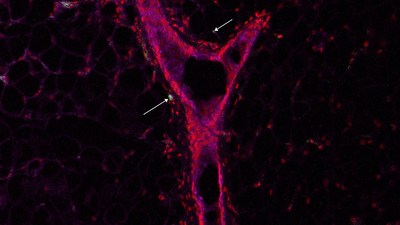Your immune system is constantly patrolling your body to keep you healthy. Sometimes, immune cells are also called into action to address a potential problem.
COLD SPRING HARBOR, N.Y., Dec. 7, 2021 /PRNewswire/ -- Your immune system is constantly patrolling your body to keep you healthy. Sometimes, immune cells are also called into action to address a potential problem. Cold Spring Harbor Laboratory (CSHL) Associate Professor Camila dos Santos' lab discovered that after pregnancy, breast cells call in immune system reinforcements called Natural Killer T (NKT) cells to prevent tumors from arising. This finding illuminates a new way in which pregnancy reduces the risk of breast cancer.
In the immune system, there are two lines of defense. The first is the innate response, which involves immune cells that attack any foreign molecule they encounter. The second is the adaptive response, which consists of immune cells that respond specifically to calls for help from certain molecules. NKT cells are a unique population of cells that are present throughout the body and that can participate in both responses. CSHL graduate student Amritha Varshini Hanasoge Somasundara says that in post-pregnancy:
"There is an increase in this specific [NKT] cell type, and only in the mammary gland. We don't see the expansion everywhere else in the body, even though NKT cells are present everywhere else in the body."
The team wanted to know what the larger number of NKT cells were doing in the breast tissue. Hanasoge discovered that in mice, breast epithelial cells, which line lactation ducts, produce a specific protein called CD1d after pregnancy. If the cells did not present CD1d, the researchers observed no increase in NKT cells in the tissue; the epithelial cells could become cancerous and grow into tumors. Hanasoge and dos Santos think that CD1d molecules are calling in NKT cells to monitor the epithelial cells in the breast tissue after pregnancy. If they become cancerous, the NKT cells can quickly kill them to prevent tumor growth.
The team's findings establish a novel link between pregnancy and the immune system in preventing breast cancer. The dos Santos lab wants to know how these findings can be translated into humans and what other factors may influence an abundance of NKT cells in breast tissue, such as aging and menopause, which are both associated with increased breast cancer risk. Dos Santos says:
"One of the hypotheses that we are working on now is: do pregnancies later on in life bring in the same expansion of the same subtypes of immune cells as pregnancies that took place early in life?"
The team published their findings on December 7, 2021 in Cell Reports.
About Cold Spring Harbor Laboratory
Founded in 1890, Cold Spring Harbor Laboratory has shaped contemporary biomedical research and education with programs in cancer, neuroscience, plant biology and quantitative biology. Home to eight Nobel Prize winners, the private, not-for-profit Laboratory employs 1,100 people including 600 scientists, students and technicians. For more information, visit www.cshl.edu
![]() View original content to download multimedia:https://www.prnewswire.com/news-releases/in-breast-cancer-the-best-defense-is-a-strong-offense-301439501.html
View original content to download multimedia:https://www.prnewswire.com/news-releases/in-breast-cancer-the-best-defense-is-a-strong-offense-301439501.html
SOURCE Cold Spring Harbor Laboratory





